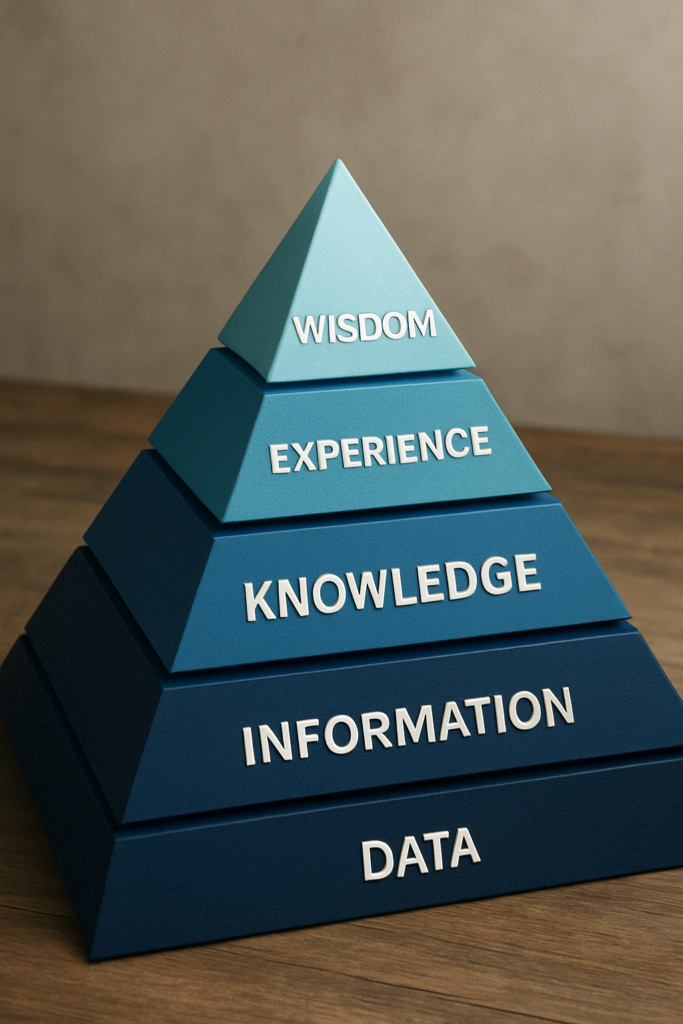Author: Doug Johnstone, Principal Consultant at Digital Pivot
Date: April 2025
For decades, digital transformation has been like building the greatest library the world has ever known.

We digitised our processes, stored petabytes of structured and unstructured data, and connected systems and people through the cloud. This vast and growing body of digital information became the engine of modern business. Knowledge workers – consultants, analysts, architects, strategists – rose as the librarians of this world. We knew how to navigate the stacks of data, derive meaning from complexity, and translate information into action.
But with the advent of Generative AI and large language models (LLMs), something profound has changed.
Today, anyone with an internet connection has access to an infinitely scalable, always-on personal librarian. One that not only understands the contents of this global library but can synthesise it, reframe it, summarise it, and even create from it – instantly.
AI has democratised access to knowledge.
And that changes everything.
Roles Are Shifting Within the Knowledge Hierarchy
To understand how disruptive this shift is, we need to revisit the classic knowledge hierarchy:
- Data: Raw facts and figures.
- Information: Organised and contextualised data.
- Knowledge: Interpreted information-knowing the “what” and “how”.
- Experience: Learned understanding through real-world application.
- Wisdom: Insight that considers context, consequence, and ethics – the “when” and “why”.

For decades, digital technology and automation operated primarily at the bottom of this pyramid—organising data and distributing information. Even traditional AI systems worked within narrow rule sets, optimising processes based on predefined knowledge.
But LLMs changed the dynamic. Suddenly, machines can operate further up the hierarchy—simulating knowledge through pattern recognition and generating content across domains once reserved for highly skilled professionals.
This doesn’t mean the hierarchy has been redefined. Instead, AI has ascended within it, and in doing so, knowledge workers must move higher—toward the domains of experience and wisdom, where machines still fall short.
So the real shift is not in the structure of the hierarchy itself, but in who does what within it.
And so the natural question arises:
Where do knowledge workers go when everyone has access to knowledge?
The New Frontier: Experience and Wisdom
The answer is clear but uncomfortable: knowledge workers must elevate their value.
We must move up the pyramid, beyond knowledge and into the layers of experience and wisdom—the very qualities machines lack.
Why? Because while AI can reproduce knowledge, it cannot replicate lived experience. It doesn’t understand trade-offs. It doesn’t anticipate consequences in messy, real-world environments. It cannot navigate politics, people, or the pressure of critical decisions made with incomplete data. It doesn’t know when to act, why a choice matters, or what not to do.
This is where human expertise becomes essential.
If AI has become the engine of knowledge, humans must become the drivers of judgement.
From Curators of Knowledge to Authors of Wisdom
We are no longer simply curators of knowledge. That role is now automated.
Instead, we must become authors of wisdom – writing the playbooks, decision trees, ethical frameworks, and strategic narratives that guide AI toward outcomes that matter. Our role is to inject our experience into these tools – to help shape how, when, and why AI is used within organisations.
In this new model, the most valuable professionals will be those who can:
- Surface tacit knowledge gained through years of hard-earned experience.
- Translate wisdom into systems that AI can learn from or be constrained by.
- Guide automation toward coherent business outcomes.
- Bring context and nuance to decisions augmented by AI.
This isn’t just about surviving in the age of AI. It’s about leading it.
Human-AI Orchestration: The Emerging Skillset
The future belongs to those who can orchestrate intelligence – combining the speed and scale of machines with the depth and discernment of human wisdom.
This means developing new capabilities:
- Systems Thinking – Seeing the whole, not just the parts. Understanding how processes, people, and technologies interconnect.
- AI Literacy – Not just using AI, but understanding how it works, where its limitations lie, and when to trust or override it.
- Narrative Framing – Telling the story that connects data to meaning. Contextualising outputs so others can act with confidence.
- Moral and Ethical Reasoning – Making values-based decisions when AI lacks the context to do so.
- Collaboration and Co-Creation – Working with AI, not against it – augmenting your thinking rather than delegating it entirely.
Wisdom is the New Competitive Advantage
In a world where knowledge is abundant, wisdom becomes scarce—and valuable.
Companies that understand this will stop focusing only on automation for cost reduction and start investing in elevation – upskilling their people to lead in new ways, document their lived experience, and operationalise their unique forms of insight.
For knowledge workers, this isn’t the end. It’s a call to rise. A call to step into roles that AI cannot fill.
Because AI doesn’t know your market. It doesn’t know your clients. It doesn’t know the mistakes you’ve made or the lessons you’ve learned. And it certainly doesn’t know what it feels like to be trusted by a customer to deliver under pressure.
But you do.
And that makes your experience priceless—if you know how to share it, scale it, and shape it for the future.
Final Thought
AI hasn’t eliminated knowledge work – it has democratised it. Now, the true value lies not in what you know, but in how you apply your lived experience. In the age of intelligent machines, Experience and Wisdom have become the ultimate differentiator.
AI in the hands of a novice can be dangerous – however AI in the hands of an expert can make you formidable – Apply your lived experience and wisdom to AI and become formidable!!
Doug Johnstone, Digital Pivot
Have questions about applying AI to your Professional Services Business?
For more information, contact us
- Rethink Offshoring – Why Automation is your better business strategy?
- Why Your Go-To-Market Strategy Needs an Urgent Reset
- The Knowledge Workers Dilemma: The Age of AI
- Why Professional Services Must Pivot in the Era of Zero-Click Search and AI
- It’s Not Just Time for Businesses to Pivot — It’s Time for Individuals to Pivot Too

